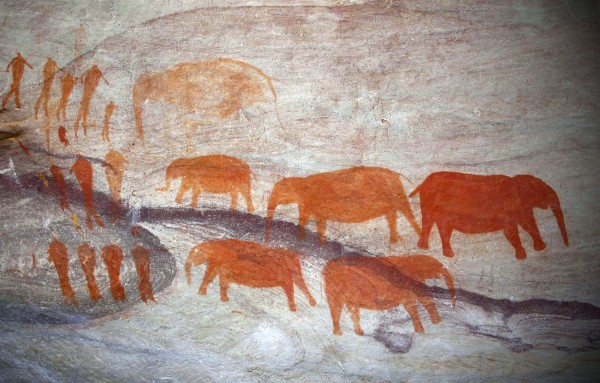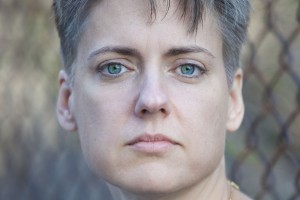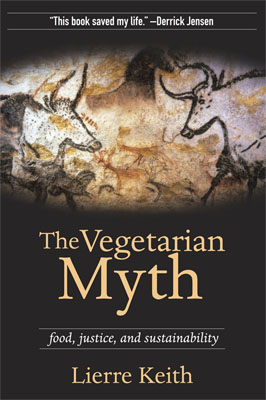Why vegetarianism will not save the world
ON THE ONE HAND, a locally grown steak, from a cow raised on grass and without hormones. On the other hand, a highly-processed soy burger that was grown somewhere far away, with many ingredients I cannot pronounce.
Up until a few weeks ago, the choice would have been easy. As a vegetarian, the soy burger is the moral choice relying on the least amount of animal suffering, the least amount of carbon/water use, and the best way for me to sleep at night.
After reading Lierre Keiths stunning and personal book The Vegetarian Myth now Im not so sure.
I consider myself I fairly well-informed eater. Ive read the works of food activists Michael Pollan and Jonathan Safran Foer. Ive seen Food Inc. and watched Gary Yourofskys blistering attack on eating meat.
And yet, in her concise and poetic manifesto, Lierre argues that vegetarians and vegans have been led astray. Weve been told that we can have a killing-free existence, and the path is paved with entirely vegetable diets. But herein lies the myth:
The truth is that agriculture is the most destructive thing humans have done to the planet, and more of the same wont save us. The truth is that agriculture requires the wholesale destruction of entire ecosystems. The truth is also that life isnt possible without death, that no matter what you eat, someone has to die to feed you.
After reading the book, I had to interview Lierre about it and how we truly come to know our food.
BNT: Why did you feel this book had to be written?
The most important reason is that the planet is being destroyed by the social arrangement called civilization. And agriculture is the activity at the base of civilization. Agriculture is, in fact, the most destructive thing that people have done to the planet. Yet the people who should care the most environmentalists dont even identify agriculture as a problem.And it gets even more bizarre in that its those very agricultural foods that are promoted as the way to save the planet. So I wanted to reach the people most impassioned about the state of our planet and try to explain that we have gotten this wrong for a generation. Its not the values that are wrong, its purely informational.
The second reason is that I didnt want a whole new group of idealistic young people to destroy their health. A vegetarian diet and especially a vegan diet does not provide for the long-term maintenance and repair of the human body. So vegetarians are on drawdown of their biological reserves.
Eventually, the rubber hits the road. There is a whole generation of us here who believed in it and tried it until we did permanent damage to our bodies. It was all for nothing. Its pointless suffering. And I want to stop the young ones from doing the same thing.
BNT: You divide each type of vegetarian/vegan into three camps: the moral, political, and nutritional. Can you (briefly) outline the beliefs of each?
The moral vegetarians believe that its possible to eat a diet that includes no animal suffering or animal deaths. The political vegetarians believe that if everyone was a vegetarian, we could feed the world and stop various kinds of environmental destruction. And the nutritional vegetarians think that animal products are the root of all dietary evil and lead to heart disease and cancer.
BNT: I fall into the moral/political vegetarian category in your book you reveal how this activism will not save the world, or produce less animal suffering. Can you explain?
First of all, lifestyle is not politics. The left has completely collapsed into these kinds of lifestyle adjustments, abandoning the concept of organizing to confront power. There are no personal solutions to political problems. Only political movements can confront and dismantle unjust systems of power.
Specifically, agriculture is biotic cleansing. It requires taking over entire living communities and clearing them away, then planting the land for just humans. All of that is a long way of saying extinction. None of us can live without a place to live, without habitat. An activity that has destroyed 98% of most animals habitat can hardly be claimed to be animal-friendly.
BNT: You write Its not killing thats domination: its agriculture. (p246) and agriculture is more like a war than anything else (p36) Can you explain how agriculture is the true villain in our goals toward a more just and sustainable world?You take a piece of land and you clear every living thing off itand I mean down to the bacteria. Thats what agriculture is. Richard Manning has this great line, A wheat field is a clear-cut of the grass forest. Hes right.
Besides the mass extinction, its inherently unsustainable. When you remove the perennial polyculturethe grassland or the the forestthe soil is exposed and it dies. It turns to desert ultimately.
Northern Africa once fed the Roman Empire. Iraq was forests so thick that sunlight never touched the groundno one in their right mind would call it the Fertile Crescent now. The dust storms in China are so bad that the soil is literally blowing across the Pacific Ocean and over the continent until it hits the Rocky Mountains, where its causing asthma in children in Denver.
The planet has been skinned alive. And the only reason we have not hit complete collapse is because weve been eating fossil fuel since 1950. This is not a plan with a future as peak oil is probably behind us and we are on the downside of Hubberts curve.
BNT: You write no one told me that life is only possible through death, that our bodies are a gift from the world, and that our final gift is to feed each other. (p236) Can you elaborate on this truth, and how we can apply this ethos to our lives and the food we eat?
There is no death-free option. The only options we have are the death thats a part of the cycle of life and the death thats destroying the cycle of life. Agriculture is the latter.
If our planet has any hope, it will be because we repair the perennial polyculturesthe grasslands, the forests, the wetlandsand take our place once again as participants in those biotic communities, instead of as destroyers of them. Thats what we did for our first four million yearswe were participants in living communities. Its only in the last 10,000 that weve become monsters.
BNT: Since your books publication in 2009, were you surprised by the reactions from the vegan/vegetarian community?
I was in the vegan world for twenty years, but I did not realize that vegans would stalk, harass, and assault me. I didnt realize that I was dealing with people who are that cult-like and fundamentalist in their mentality. I cant speak in public without security now. And they have let me know that they know where I live.
They have, ironically, proved my point about the psychology of veganism better than my words ever could. I dont give in to bullies, and besides, my planet is at stake. So Im not going to stop. But there is a very scary psychology running through this community.
BNT: On the other hand, did any unforeseen allies reach out afterward that you didnt expect?
I get emails every day from ex-vegans, thanking me for saving their lives. That makes it worth it. And Ive also met farmers who have given up annual monocrops and are restoring their land to prairies and savannahs, in part because of my book. There are birds nesting on those lands that havent been seen for over a hundred years. That definitely makes it worth it. Ill take the hostility of vegans in exchange for a nest of fledglings any day. Its amazing to think that my work has had that kind of an impact.
BNT: Given the response, is there anything you would have argued differently looking back?
No.
BNT: In order to save the world we must know it. (p247) You write that much of the destruction we inflict on the world is a result of our disconnection. How can each of us truly come to know the world?
We have to build relationships with the creatures that make our lives possible and with whom we share this planet. And thats all of themthe bacteria, the plants, the insects, the birds. Not just the mammals. Everybody else. Animals are only 15% of life.
In a biological sense, this is a planet of bacteria. They are the people doing the basic work of life. They keep the basic cycles goingthe carbon cycle, the nitrogen cycle, without which no animals would be here. We need to get profoundly humble before the incredible activities they do that make our lives possible. That humility needs to be the basis of our culture, our religion, our reality.
BNT: You write If you hear nothing else in this book, hear this: there is no personal solution. (p264) Also, the task of an activist is not to negotiate systems of power with as much personal integrity as possible its to dismantle those systems. (p265) Why do you feel the mainstream emphasizes personal lifestyle choices as the main path to a better future, and why do you believe this path is misleading?
Its misleading because its useless. The mainstream has taken this up because its easy. It requires no risk. Direct confrontations with power, on the other hand, require serious courage.
As Frederick Douglass wrote, Power concedes nothing without a demand. It never did and it never will. Saving this planet will require a serious resistance movement to industrial capitalism and ultimately to civilization.
BNT: You state in your book that you avoid easy answers to complex resistance, but you still offer some basic guidelines. One powerful question you offer is to ask what grows where you live? Why is this so important?
I offered those guidelines about what to eat because I knew people would want to know. I did not call them resistance, because theyre not resistance.
The question about What grows where you live? is important because to answer it you have to know the place that you live. You also have to know what activities and what actors are destroying it. I would hope that from there, people would be moved to defend their homes.
BNT: Finally, as we move into an uncertain future, you state the importance of inoculating people against future fascism (p268) Why do you see this as crucially important?
In times of social collapse, desperate people can do very ugly things. Since the book was released, weve seen the rise of the Tea Party movement, who have successfully run candidates for office. The public discourse has turned more and more to violence, Gabby Giffords was shot and others killed.
People are getting desperate in this country as the wealthy have destroyed first the working class, then the middle class. All thats left are the poor, the old, and the sick, and now the republicans are going after Social Security and Medicaid. Rick Perry is running for president, and he is a Dominionist Christian who truly believes that the United States should be a religious theocracy. We need to get active or we will be living under the christian Taliban.
Grab a copy of Lierre Keiths book The Vegetarian Myth.
What do you think of Lierres argument? Share your thoughts/reactions to Lierres argument.



Comments